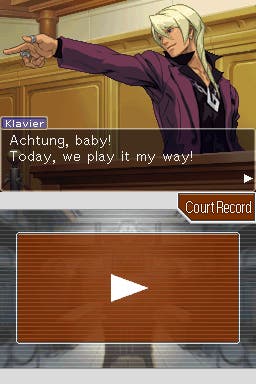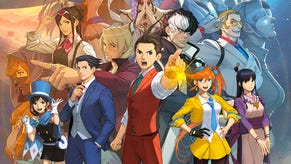Apollo Justice: Ace Attorney
Another Ace up their sleeve.
There are some reading this who want to know nothing about Apollo Justice: Ace Attorney, the fourth game in the AA series and the first to see Phoenix Wright's name removed from the box. But they want to know whether to buy it or not. To them, the answer is: yes. But, well, just don't expect all your wishes to come true. Read no more.
Everyone else, do not fear, there are no terrible spoilers to come, but I will be discussing the nature of the game beyond the events of the tutorial [good to know - Commissioning Ed], and that will mean discussing what some would consider surprises. I promise it's unavoidable, and certainly not game-ruining. There, no one can sue me now.
The news that the next Ace Attorney wasn't to be about Phoenix was met with a lot of uncertainty. While Trials & Tribulations offered a satisfying conclusion to the Kurain Channelling Technique storyline, it certainly didn't sum up everyone's arcs, not least of all Maya and Pearl's. Were we really ready to move on to a whole new lawyer, and a whole new cast?
The answer was, and indeed is, no. Because the most surprising thing about Ace Apollo is that Phoenix is a central character, from being the defendant in the tutorial, to appearing every case thereafter in increasingly convoluted roles. It really is a new Phoenix Wright game, even if you're playing as Apollo Justice.
From the beginning, it's immediately apparent how much is the same. While nearly all the locations have been given a graphical overhaul, many including the courtroom and Lobby No. 3 will feel very familiar. All the characters have been redrawn too, with Phoenix now sporting a blue beanie hat to hide his famous hair. All, that is, but for the Judge. Whether his being left in his original low-res design is a joke is unclear, but in a game that's already seeming a bit too much like its GBA predecessors, it's a dubious decision.

And the action is much the same as well. You have your Court Record filled with evidence and profiles, and the option to Press or Present during witness testimonies. The one noticeable change is the inability to "present" character profiles either in court or during conversations elsewhere - this might be to simplify the overwhelming numbers of options when you're left guessing. However, I think what everyone would have preferred was to see the series move away from those daft situations where perfectly valid evidence is refused in inexplicable moments, rather than simplify. For better or for worse, Apollo Justice is just as guilty of this crime as all the previous three.
In between court sessions, as ever you move from location to location, examining scenes for evidence, chatting with the characters, and, fantastically, falling about laughing at the wonderful writing. The localisation team for these games are modern heroes (heroes we've tried our best to interview, but Capcom and Nintendo have made it completely impossible for us to get to them for reasons we cannot fathom). I can't remember the last time I laughed out loud this often at a game, often with worrying volume.
So the premise. You are rookie lawyer Apollo Justice, who through the events of the tutorial finds himself out of a job. Phoenix, we quickly learn, hasn't been practising law for seven years, after an... incident. Instead he's working for a restaurant playing piano, despite only knowing one song and playing it terribly. The table nearest to the piano, we're told, is the hardest to fill. But this is only a cover for his real job - playing not-for-profit poker in a sinister back room that was once used by underground criminals. In seven years he's never been beaten, and has become quite the word-of-mouth tourist attraction. Oh yeah, and apparently he's a daddy.






